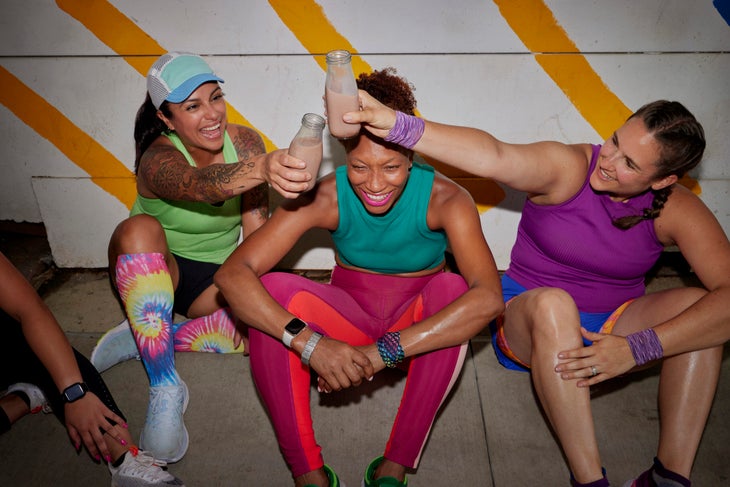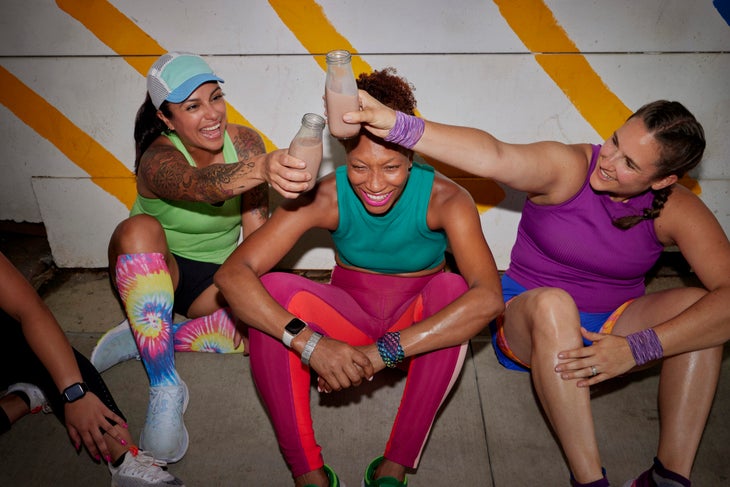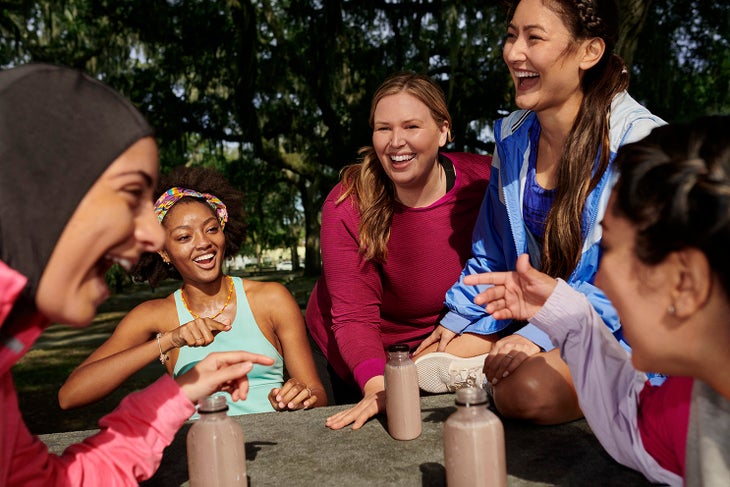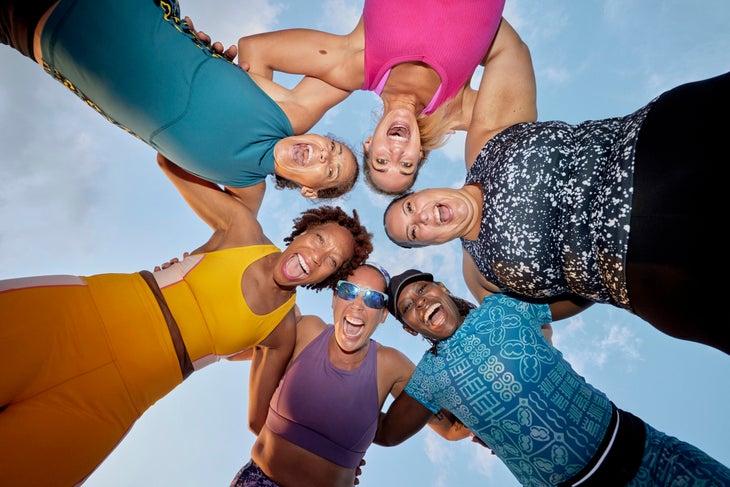
Pre-race yoga sessions. Training guides and support from female Olympians. Chocolate milk toasts. Tampons stocked in every Porta-potty. You’ve never seen a race quite like this before—and it’s changing the face of running for rookies and elite athletes alike.
Every Woman’s Marathon, powered by Team Milk, is a U.S. marathon designed by women, for women. It was born of a clear need: the dire lack of female-centric marathon experiences available for distance runners. Though almost half of American marathon participants are women, 60 percent of female runners feel that endurance races cater more to men. Historically, women were excluded from marathons because of the (ridiculous) belief that they couldn’t handle the distance; it wasn’t until 1972 that the prestigious Boston Marathon allowed women to participate. That legacy of exclusion still persists across many distance races even today, with race design, gear, and training guides predominantly geared toward men.

The first-ever Every Woman’s Marathon seeks to change all that. Scheduled for November 16, 2024, in Savannah, Georgia, this race puts women front and center. These 26.2 miles have been designed to be a physically, psychologically, and emotionally safe space for all women, from first-timers to experienced runners. Organizers emphasize community above competition, making sure the event welcomes all running abilities and body types. After all, 88 percent of women in a recent survey expressed the need for race events that embrace more diverse participants, and nine out of ten female distance runners say being part of a community is what motivates them to run.
What makes Every Woman’s Marathon truly for every woman? Each participant gets access to training and nutrition plans, which include tips and tricks from the marathon’s advisory board, including two-time Olympian Des Linden, Harlem Run founder and trailblazer Alison Mariella Désir, eight-time national champion Deena Kastor, cancer survivor and world champion adaptive athlete Danielle McLaughlin, and the first woman to compete in the Boston Marathon in 1967 Katherine Switzer. These training guides are tailored for every kind of runner, from mothers to beginners to longtime racers. More than just a race, Every Woman’s Marathon features two days of community and wellness programming, complete with cooking and yoga classes, inspiring panels, and an epic post-race party. All events were designed with families in mind and feature amenities like nursing pods and a designated kids’ play area. And the marathon itself will have wheelchair-accessible lanes, spirit squads at every mile, and a nonstop empowering vibe. (Oh, and organizers truly mean the every part: this marathon welcomes all adults, including trans or nonbinary people and men.)

Team Milk and marathons are a natural match. Cow’s milk is a nutritional powerhouse for runners, providing fuel, hydration, and recovery benefits all in a single glass. “Milk is one great option for runners because it provides all of the important pre- and post-run nutrients in one drink,” says Stephanie Darby, a Colorado-based registered dietitian who focuses her practice on female runners. “It has protein and carbohydrates, a little bit of fat, electrolytes, and fluids.”
Let’s break that down: the high-quality protein found in cow’s milk supports lean muscle development. Women know the power of this strength-building nutrient, with 70 percent of female runners reporting that they seek out protein to support their training. Carbohydrates and fat provide crucial energy. Fluids help replace what runners lose through sweat during a training session or race, and electrolytes restore fluid balance and support muscle function. Specifically, milk contains three key electrolytes for athletes: magnesium, sodium, and potassium. Milk also packs B vitamins, which help convert food into energy; vitamin A, zinc, and selenium, all of which support immune system health; iodine, which helps regulate the metabolism; and calcium, vitamin D, and phosphorus, which are critical for bone health.

That extensive list of nutrients makes milk an excellent training partner anytime, but it’s particularly powerful as a recovery drink, Darby says. “It’s ideal after training,” she notes, “because you need its 3:1 ratio of carbohydrates to protein to replenish your glycogen stores”—your muscles’ fuel supply. “It also has the fluids you need to replenish from sweating.” In fact, milk’s fluid-plus-electrolytes package rehydrates even better than water. Scientific studies have shown chocolate milk in particular excels as a recovery beverage, building better muscle glycogen concentrations than carbohydrate-only drinks do and extending running capacity for extra workouts.
Not only that, but drinking milk also helps prevent muscle soreness by quickly replacing fluids and nutrients, keeping runners on track with their training. Darby points out that runners often don’t feel hungry after exerting themselves, so “It can be hard to consume adequate nutrients for recovery.” Milk, an all-inclusive, easy-to-consume recovery drink, makes getting those critical nutrients much more palatable.

But the benefits aren’t confined to after a run. Milk provides sustained energy to fuel workouts, both short and long. Incorporating milk into the diet all day long—from morning smoothies, oatmeal, or lattes to afternoon protein shakes to golden milk in the evening—helps ensure runners have the oomph they need to tackle marathon training.
Registration is now open for Every Woman’s Marathon! Join the more than 4,000 women already committed to gathering in Savannah here. When you sign up, a portion of the registration fee goes to your choice of one of five incredible organizations dedicated to supporting women and girls: Girls on the Run, Black Girls Run, 261 Fearless, St. Jude Children’s Research Hospital, and Girl Scouts of Historic Georgia. The marathon world will never be the same.
The Milk Processor Education Program (MilkPEP), based in Washington, DC, is funded by the nation’s milk companies and is dedicated to educating consumers and increasing the consumption of fluid milk. For more information, visit MilkPEP.org.
